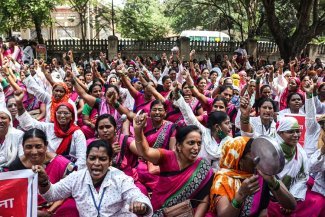Omar Faruk Osman, head of the independent Somali trade union federation FESTU and the journalists’ union NUSOJ.
The head of Somalia’s national journalists union, NUSOJ, says the International Labour Organization (ILO) should launch its own commission of inquiry into violence and intimidation against union officials in the country, because he doubts the government will follow the ILO’s call to investigate and bring offenders to justice.
The UN agency in November called on the Somali government to launch “independent judicial inquiries’’ into violations of freedom of association and persecutions of trade unions “in order to fully uncover the underlying facts and circumstances, identify those responsible, punish the guilty parties, and prevent the repetition of such acts.’’
The ILO also called on Somalia to rapidly report back on measures it has taken “to ensure that the FESTU” – the Federation of Somali Trade Unions – “and NUSOJ can fully develop their trade union activities without hindrance.”
In an interview with Equal Times, Omar Faruk Osman, head of FESTU and NUSOJ, said he would wait until mid-year for the Somali government to act, but that he believes further ILO action would be needed.
What’s the impact of the ILO decision so far?
For us the ILO case is a victory for the workers of Somalia, but also for the wider civil society. It demonstrates that civic society in Somalia, which believes that their human rights were violated, can seek redress or remedies from an international human rights body set up by the United Nations.
The government doesn’t want an independent union of journalists. They wanted a union which they controlled, which remains their puppet, endorsing whatever they say. They do not want a very outspoken, critical, independent organisation that challenges them. When I say government, I mean those officials who act without a collective government decision or approval of the most senior leaders of the country such as the prime minister or the president.
The Ministry of Information would make the puppet leaders for our union, and they would pressurise and intimidate the international community by saying ‘you have to follow our line.’ The government was bullying and harassing the judiciary. The judges were afraid that if they took a position different from the government position, they may lose their job. And it has happened already. When we won a case against the ministries of information and labour at the Supreme Court in February 2016, the government sacked the chief justice in direct breach of the constitution of Somalia. So, every judge is now afraid.
You’ve said the government’s campaign against your organisations were encouraging and empowering those who wanted to attack you. Were there more in the past year?
Yes. The campaign to discredit and delegitimise us was giving way to all sorts of forces to attack us. To legitimise our own victimisation. And I have to mention, not all, but some members of the international community were part and parcel of this legitimisation. Why? Because they want to feel good, look good, with the government officials.
Because they want to empower a shaky government?
Yes, they wanted to empower a shaky government by any means, and their deafening silence dictates that they want to empower it, even to detriment of fundamental human rights. And as I said earlier they want to feel good, look good. Some of them have other agendas with the government and would even dare to close their eyes to flagrant human rights abuses. But we were vindicated by the ILO because we went to the rights body, which has the sole authority to adjudicate cases of human and trade union rights.
But you don’t have much faith in Somalia launching an independent inquiry?
No, we don’t. But we know where we are going. Because if the Somali government doesn’t even set up an independent judicial inquiry, and does not bring credible conclusions, we will ask the ILO to go for a commission of inquiry set up by the ILO itself. The ILO will have to take matters into its own hands.
When will you do this?
We will give them up to June of this year, then we will meet with world trade union leaders at the International Labour Conference where we will set out the ILO Commission of Enquiry. If the government of Somalia doesn’t comply, we will be going for the commission of inquiry. Because our rights cannot be flouted, the abuses cannot continue with impunity. We have raised the alarm for our members and our leaders to be very vigilant, to be careful. But we are also letting the world know of the abuses taking place, and how our rights have been violated. We are using the ILO ruling to tell the world that this is where the rights have been won, and we have secured the victory that we needed.
What kind of leverage does the international community have?
They give money, they pay salaries. They are training them, they are giving them equipment, they are giving them legitimacy. In other words, the government cares about its image with international community. Somalia’s non-compliance with international conventions of the ILO that it ratified could also lead the ILO to put Somalia in a “special paragraph” status, which would seriously disturb foreign business and international investments.










